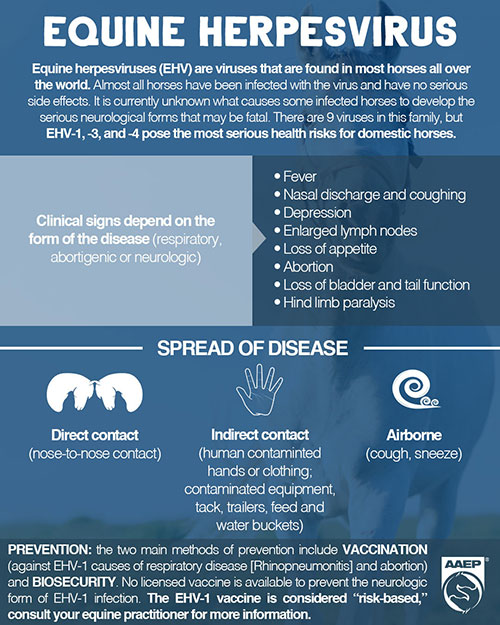We have had a positive case of EHV-1 diagnosed in West Kent on 31/08/22. The yard involved has been locked down and they are following set guidelines to prevent any further spread, Code Of Practice: Equine Herpesvirus. Please read the information below and call us if you have any queries. It may be wise to be extra cautious about biosecurity if you are going out with your horse in the West Kent area in the next few weeks. This is not a notifiable disease, so there is no legal requirement for individuals to stay at home.

Equine herpes virus facts:
EHV causes four clinical syndromes:
1) Respiratory
2) Abortion
3) Neonatal foal death
4) Neurological disease – the paralytic form, which may or may not be related to previous or on-going respiratory disease
Respiratory Disease: What to look out for
- Fever
- Coughing
- Nasal Discharge
Neurological Disease: What to look out for
- Incoordination of the hind (and occasionally fore) limbs
- Urine retention/dribbling – can present as mild colic
- Recumbency (inability to rise)
- Neurological signs may or may not be preceded by fever and respiratory signs.
How is the virus spread?
The virus causes respiratory infection. Spread occurs from horse-to-horse contact (nose-to-nose) and any nasal discharge will be contagious. People can also transmit the virus by handling an infected horse and then touching another unaffected horse; likewise tack and equipment can spread the virus from horse to horse. The virus can also spread in the air (aerosol spread), especially to adjacent stables. The virus cannot spread long distances in the air and does not survive for long periods in the external environment. Close contact between horses within a yard or between adjacent yards is usually required to allow spread.
The incubation period may be as short as 24hours, but more typically is approximately 4 – 6 days, and horses are most infectious in the early stages of infection (when the temperature is raised).
Another important feature of the Herpes viruses is their ability to lie dormant (latent) in the body. A horse can therefore be infected for life, and can intermittently discharge the virus from the nose and infect susceptible horses. Stress may result in a latently infected horse starting to shed virus into the environment again, so avoid stressful situations in your yard.
Prevention
- Call Bell Equine on 01622 813700, if disease is suspected.
- Isolate any horses showing a temperature rise and/or respiratory signs
- Keep pregnant mares away from other horses, especially new arrivals.
- Minimise stress, where possible, e.g. by avoiding prolonged transport. So keep your horses as comfortable as possible in a normal routine.
- It is best to isolate any new horses coming onto a yard for a minimum of 10 days
- Be fastidious with hygiene at all times, such as avoid nose to nose contact between visiting horses, do not share water buckets, feed bowls etc, disinfect horseboxes between transporting different horses and change clothing and wash hands after contact with other horses.
Vaccination
This is NOT recommended in the face of an outbreak. Vaccines against Equine Herpes viruses are available, but they are not effective against the neurological form of the virus. The vaccine is not 100% effective and will not necessarily prevent a horse from becoming infected by the virus.
Vaccination has a role, when combined with good biosecurity and hygiene measures. This is most important in competition yards where horses are coming and going from shows. If your horse is healthy and is not linked to any outbreak, then there is no reason not to vaccinate as that way you will be doing all you can to prevent EHV.
The vaccine has to be given as 2 doses 4-6 weeks apart, followed by 6 monthly boosters. If you are thinking of vaccinating your horse, it is advisable to vaccinate the whole yard to reduce the risk of infection becoming established in the overall population. Pregnant mares can be vaccinated at 5, 7 and 9 months of gestation to reduce the risk of EHV-1 abortion.
Please call Bell Equine on 01622 813700 if you have any questions and look out for updates on our Facebook page.
